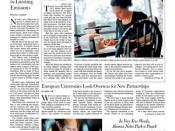This paper explores trends in higher education in terms of Max Weber's theory of rationalization. It is Weber's contention that there are four basic motivators for human behavior. People are motivated by custom or tradition, by emotions, by religious or ethical values, and by rational goal oriented behavior (which Weber calls "zweckrational"). All human behavior, Weber claims, is motivated by various combinations of these four basic factors.
Weber's thesis is that bureaucracies increasingly centralize and broaden their scope in advanced industrial societies. Bureaucracies are human organizations specifically designed for the efficient achievement of short-term rational goals. As societies become more bureaucratic, Weber states, goal oriented rational behavior becomes dominant in guiding our actions--at the expense of traditions, emotions, and values. It becomes a habit of thought, a way of interpreting our world. This trend is called the "rationalization" process.
The final factor that should be understood in Weber's theory of rationalization is the phenomenon of the "irrationality factor."
Just because an action is rational in terms of fulfillment of a short-term goal, Weber asserts, does not mean it is rational in terms of the whole society. It often happens, he writes, that an excessive focus on short-term goals undermines the very goals of both the society and the bureaucracies themselves.
In the past, higher education was seldom as bureaucratically organized as corporate and government institutions. This was mainly due to European traditions and the fact that universities are very dependent upon a large number of highly educated professionals who used their numbers and expertise to demand a voice in university governance. This, however, is beginning to change.
Internal Efficiency
There are several rationalizing trends at American universities that can be considered to be home grown--internal to the university, mirroring the more goal oriented norms of measurement, coordination, and efficiency...


